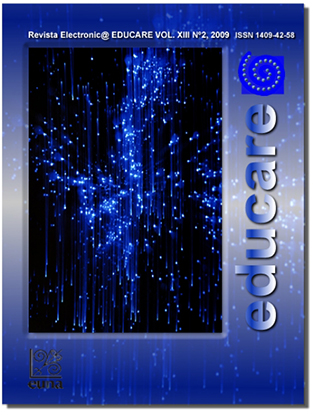Espacios vitales de aprendizaje: su ecología en el sétimo año de la educación pública costarricense
DOI:
https://doi.org/10.15359/ree.14-1.15Keywords:
learning ecology space, environment, seventh grade, middle school, teacher profileAbstract
The present article is the result of an investigation between CIDE-UNA to build a desirable profile for teachers that might teach seventh grade in Costa Rican public education schools. This article evidences transparency in the ecology of learning spaces, known as the environment, the actors involved and their complex interrelations. There is also a description of these spaces and their incidence in the permanence and promotion of the students population, in the singular moment in which the educational system imposes them the first and rough institutional changes coinciding with physical transformations and social and familiar relationships.
References
Alfaro, M., Brenes, A., Gamboa, A., Jiménez, S., Martín, J., Ramírez, A., et al. (2008). Construcción
del perfil de desempeño docente para el sétimo año de la educación pública. Informe Final
de Investigación. Heredia: Universidad Nacional.
Aparicio, E. (2007). Metodologías cambiantes en espacios de mejora de la calidad universitaria.
Recuperado el 27 de febrero, 2008, de http://www.eduonline.ua.es/jornadas2007/
comunicaciones/2C4.pdf?PHPSESSID=cbccbdf7bdf77780f5153163c2f16c2a
Bascuñan, J. & López, M. (1998). Observación de procesos educativos en el aula. Psicología ecología
aplicada a la sala de clase. Recuperado el 27 de febrero, 2008, de www.sectormatematica.
cl/pedagogía/07%20OBservacion%20DE%20PROCESOS%20EDUCATIVOS%20EN%20
EL%20AULA.DOC
Bisquerra, R. (coord.) (1998). Modelos de orientación e intervención psicopedadógica. Barcelona,
España: Praxis.
Boeglin, M. (2008). Leer y redactar en la universidad. Del caos de las ideas al texto estructurado:
Bogotá, Colombia: Eduforma.
Bronfenbrenner, U. (1987). La ecología del desarrollo humano. Barcelona, España: Paidós.
Candegabe, S. (2001). Ideas para organizar el aula. Recuperado el 30 de abril, 2007, de www.
turemanso.com.ar/fuego/educacion/organizaraula.html
Cortés, A. (2002). La contribución de la psicología ecológica al desarrollo moral. Un estudio con
adolescentes. Recuperado el 27 de febrero, 2008, de www.um.es/analesps/v18/v18_1/07-
_1.pdf
García, F. A. (2001). Mesa Redonda: Conceptualización del desarrollo y la atención temprana
desde las distintas escuelas psicológicas. Modelo ecológico/modelo integral de intervención
en atención temprana. Recuperado el 27 febrero, 2008, de www.paidos.rediris.es/genysi/
actividades/jornadas/xijorp/xi_Garcia.pdf
García, N., Rojas, M., Campos, N., Brenes, M. & Campos, E. (1993). Conocimiento, participación
y cambio: capacitación a docentes a partir de la investigación en el aula. San José, Costa
Rica: EUCR.
Gómez, L. F. (2003). Las teorías implícitas de los profesores y sus acciones en el aula. Recuperado
el 24 de enero, 2008, de www.eva.iteso.mx/trabajos/lgomez/ponenciateoriasimplicitas.pdf
Morin, E. (1999). Los siete saberes necesarios para la educación del futuro. París, Francia:
UNESCO.
Oliver, J. (1989). Espacios educativos y sistemas de formación. Metodología ecológica y organización
educativa. Recuperado el 24 de enero, 2008, de www.dialnet.unirioja.es/servlet/fichero_articu
lo?codigo=117613&orden=61997
Ribaya, F. (2007). La ausencia a clase. Recuperado el 24 de enero, 2008, de www.quadernsdigitals.
net/index.php?accionMenu=hemeroteca.VisualizaArticuloIU.visualiza&articulo_id=10209
Downloads
Published
How to Cite
Issue
Section
License
1. In case the submitted paper is accepted for publication, the author(s) FREELY, COSTLESS, EXCLUSIVELY AND FOR AN INDEFINITE TERM transfer copyrights and patrimonial rights to Universidad Nacional (UNA, Costa Rica). For more details check the Originality Statement and Copyright Transfer Agreement
2. REUTILIZATION RIGHTS: UNA authorizes authors to use, for any purpose (among them selfarchiving or autoarchiving) and to publish in the Internet in any electronic site, the paper´'s final version, both approved and published (post print), as long as it is done with a non commercial purpose, does not generate derivates without previous consentment and recognizes both publisher's name and authorship.
3. The submission and possible publication of the paper in the Educare Electronic Journal is ruled by the Journal’s editorial policies, the institutional rules of Universidad Nacional and the laws of the Republic of Costa Rica. Additionally, any possible difference of opinion or future dispute shall be settled in accordance with the mechanisms of Alternative Dispute Resolution and the Costa Rican Jurisdiction.
4. In all cases, it is understood that the opinions issued are those of the authors and do not necessarily reflect the position and opinion of Educare, CIDE or Universidad Nacional, Costa Rica. It is also understood that, in the exercise of academic freedom, the authors have carried out a rogorous scientific-academic process of research, reflection and argumentation thar lays within the thematic scope of interest of the Journal.
5. The papers published by Educare Electronic Journal use a Creative Commons License:















 The articles published by Educare Electronic Journal can be shared with a Creative Commons License:
The articles published by Educare Electronic Journal can be shared with a Creative Commons License: 



